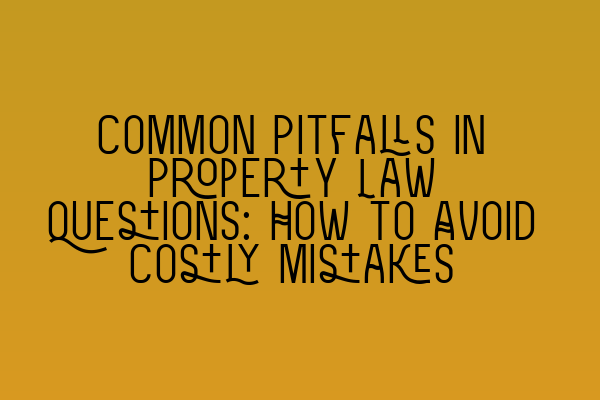Common Pitfalls in Property Law Questions: How to Avoid Costly Mistakes
Are you preparing for your SQE Property Law or Land Law exam? Are you concerned about the common pitfalls that many aspiring solicitors fall into? Look no further! In this blog post, we will discuss some of the most common mistakes made when answering property law questions and provide practical tips on how to avoid them.
1. Failure to identify the key issues: One of the biggest pitfalls in property law questions is failing to identify the key issues in the given scenario. It is crucial to carefully read and analyze the question, keeping in mind the relevant legal principles and concepts. This will enable you to identify the main legal issues at stake and structure your answer accordingly.
2. Lack of clarity and structure: Another mistake often made is providing answers that lack clarity and structure. Your answer should be well-organized and include a clear introduction, body, and conclusion. Make sure to address each legal issue separately, using headings or subheadings to enhance readability. This will not only help you effectively communicate your knowledge but also show the examiner that you have a solid understanding of the topic.
3. Insufficient case law and legislation reference: Property law is heavily based on legislation and case law. Failing to reference relevant statutes or key cases can weaken your answer. It is important to cite the appropriate legislation and case law to support your arguments and demonstrate your knowledge of the subject matter. Dig deep into your research and ensure that you have a good grasp of the relevant authorities.
4. Neglecting to consider alternative arguments: In property law questions, there are often multiple perspectives and potential arguments. It is a common mistake to focus solely on one side of the argument without considering alternative viewpoints. Make sure to explore different approaches and address counterarguments to provide a well-rounded and comprehensive answer.
5. Ignoring the practical implications: Property law is not just about understanding the legal principles; it also involves considering the practical implications. Many students fail to discuss the practical consequences or remedies that may arise in a given scenario. To avoid this pitfall, consider the practical implications of your analysis and suggest appropriate solutions or actions.
6. Inadequate time management: Time management is crucial in exams, and property law questions can be particularly challenging in terms of time constraints. Allocate your time wisely by planning your answer before diving into writing. Prioritize the most important issues and allocate sufficient time to each section of your answer. Practice with mock exams to improve your time management skills.
7. Overcomplicating the answer: Sometimes, students fall into the trap of overcomplicating their answers with unnecessary jargon or convoluted language. Keep in mind that simplicity and clarity are key. Use plain language and avoid excessive legal terminology unless necessary. Remember that the examiner is assessing your understanding, not your ability to use complex language.
In conclusion, preparing for property law questions can be daunting, but by avoiding these common pitfalls, you can enhance your chances of success. Be sure to identify the key issues, provide a well-structured and clear answer, reference relevant case law and legislation, consider alternative arguments, discuss practical implications, manage your time effectively, and keep your answer concise and to the point.
If you want to further enhance your preparation for the SQE exams, consider enrolling in our SQE 1 and SQE 2 Preparation Courses. Additionally, you can test your knowledge with our SQE 1 Practice Exam Questions or SQE 1 Practice Mocks FLK1 FLK2. Stay updated with the latest SRA SQE Exam Dates to ensure you are well-prepared for the upcoming assessments.
Remember, learning from mistakes is part of the journey to becoming a successful solicitor. Best of luck with your property law studies and exams!
SQE 1 Practice Exam Questions
SQE 1 Practice Mocks FLK1 FLK2
SQE 2 Preparation Courses
SQE 1 Preparation Courses
SRA SQE Exam Dates
